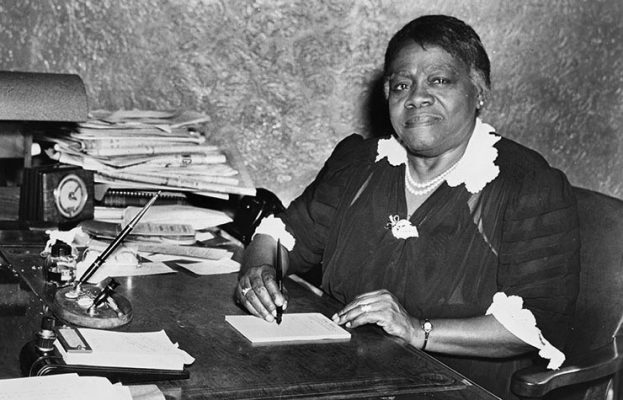This article was first published on palmettopromise.org
In recognition of Black History Month, we celebrate the life and legacy of Mary McLeod Bethune, a crucial figure in South Carolina’s education history.
On July 10, 1875, Mary Jane McLeod was born in the small town of Mayesville, South Carolina in Sumter County. Until the age of 10, the sum of her understanding was limited to her life experience of being a daughter to former slaves and picking cotton with her family.
Then, one day while working at her landlord’s home, she picked up her first book and her life changed forever. She later wrote of the experience: “the whole world opened to me when I learned how to read.”
Bethune did not let her new skill go to waste…or keep it to herself. She went on to study at two seminaries in North Carolina, became a teacher at an institute in Georgia, then later taught near her birthplace in Sumter, South Carolina.
Bethune had a dream of starting her own school and this dream became reality when she moved to Florida and founded the Daytona Educational and Industrial School for Negro Girls. Years later, that school merged with the local Cookman Institute and the institution is currently known as Bethune-Cookman University with an enrollment of nearly 4,000 and an endowment of $48 million.
Bethune’s life accomplishments touched public policy as well—the National Association of Colored Women’s Clubs, the National Association for the Advancement of Colored Persons, the Women’s Army Corps, and the National Council of Negro Women. Her life is a testament to how learning to read allows individuals to not only see a world beyond their current circumstances, but that it inspires individuals to pursue dreams that are greater than themselves. Bethune was a pioneer in education, and a true forerunner who created an institution by black Americans and for black Americans at a time when education was not readily accessible to them.
Fast forwarding to 2021, Mary McLeod Bethune is an inspiration to me in my work at My SC Education. My SC Education was founded to see to it that all South Carolina children—no matter what kind of house they live in or the color of their skin—have access to the education option that helps them reach their full, individual God-given potential.
I say “God-given,” and much of Bethune’s work in education had a connection to the church. In the same vein, My SC Education and Palmetto Promise Institute recently came together to host a stream titled Pastor, Let’s Talk Solutions to specifically talk about how churches can take the lead in school development to help black students struggling in their current educational environment.
During that online meeting, Reverend Doug Slaughter of Second Baptist Church in Aiken, SC (and a school founder himself) made an important point: one of the first things black people did first after coming out of slavery was to establish schools. We have seen this example in other groups such as Roman Catholics and Jews establishing their own institutions for education.
Yet what makes Pastor Slaughter’s example distinct is that this was a group of people not united by religion, but by the shared experience of having come of out slavery and seeking to establish their own footing as free men on free American soil.
Their efforts were supplemented by Julius Rosenwald, one of the owners of Sears Roebuck who established the Rosenwald Fund. Rosenwald impacted South Carolina education for black students as he worked alongside Booker T. Washington in a philanthropic effort that led the formation of about 500 schools built in South Carolina (and as many as 5,000 schools, shops and teachers homes across the South).
These “Rosenwald Schools” operated until the end of segregation in the early 1970s, including a school in South Carolina’s Capital of Columbia called Booker T. Washington High School. (That building has been preserved by the University of South Carolina.)
During February, Black History Month, we salute leaders like Mary McLeod Bethune and other pioneers like her in African-American education. We hope that this short history lesson will inspire you like it does us in our work to ensure that every child realizes the promise and hope of a quality education.
If you would like to learn more about Mary McLeod Bethune and My SC Education’s work, here are some helpful links:
National Women’s History Museum: Who is Mary McLeod Bethune?

